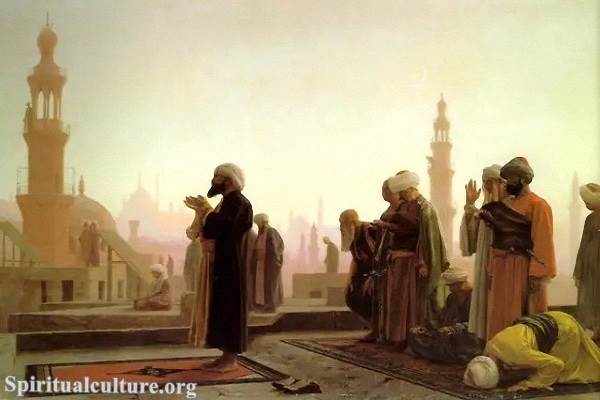In every heart, there is a longing — a yearning to connect, to know, and to belong. This deep-seated desire to find meaning in life and unity in existence has led countless seekers across cultures and centuries toward one foundational truth: the oneness of the Divine. In Islam, this truth is encapsulated in a concept both simple and infinite — Tawheed.
Tawheed (توحيد) is the very heart of Islamic theology. It is the recognition, affirmation, and unwavering declaration that there is no god but God. But far beyond being a doctrinal statement, Tawheed is a lens that reshapes how we see the world, ourselves, and our relationship with everything around us.
In this exploration, Spiritual Culture invites you into the profound mystery and clarity of Tawheed — not only as a theological idea, but as a way of living, being, and returning to the Source.
The Meaning of Tawheed: More Than Monotheism
Tawheed in Linguistic and Theological Terms
The Arabic root “wahhada” means to unify, to make one. From this comes Tawheed, meaning “to declare oneness.” In Islamic theology, it refers to affirming the absolute oneness of Allah in His essence, attributes, and actions.
It is not merely the idea that God is one (as opposed to many), but that God is uniquely One — incomparable, indivisible, and beyond all human constructs of form or duality.
The Qur’an states:
“Say, He is Allah, [who is] One. Allah, the Eternal Refuge. He neither begets nor is born, nor is there to Him any equivalent.”
(Surah Al-Ikhlas 112:1–4)
These few verses encapsulate the theological core of Islam — God is utterly unique, self-sufficient, uncreated, and alone in divinity.
Beyond Abstract Belief: A Living Faith
Tawheed is not confined to belief systems or religious identity. It is meant to penetrate every aspect of life — thoughts, actions, intentions, and emotions. It means living with a constant awareness that everything originates from and returns to the One.
The Three Dimensions of Tawheed in Islamic Theology
Islamic scholars have historically explained Tawheed through three primary dimensions, each deepening our understanding of God’s oneness.
Tawheed al-Ruboobiyyah – Oneness of Lordship
This aspect affirms that Allah alone is the Creator, Sustainer, and Ruler of all that exists.
“It is Allah who created the heavens and the earth and whatever is between them in six days; then He established Himself above the Throne.”
(Surah Al-Furqan 25:59)
Nothing happens outside of His will. Every breath, every heartbeat, every rain that falls — all are under divine command.
Implication in Life
To accept God’s lordship is to surrender the illusion of control, to trust that life unfolds under divine wisdom. It cultivates humility, patience, and deep trust (tawakkul) in the unseen plan.
Tawheed al-Uloohiyyah – Oneness of Worship
This is the exclusive devotion to Allah in worship. No prayer, no sacrifice, no reliance is directed toward anything or anyone else.
“And your God is one God. There is no deity [worthy of worship] except Him, the Entirely Merciful, the Especially Merciful.”
(Surah Al-Baqarah 2:163)
Implication in Practice
This dimension demands a life of sincerity (ikhlas) and pure intention. It’s a call to remove inner idols — ego, status, wealth — and place all love, fear, hope, and reliance in God alone.
Tawheed al-Asma’ wa-Sifat – Oneness of Names and Attributes
This involves affirming Allah’s names and attributes as described in the Qur’an and Sunnah without distorting, denying, or comparing them to creation.
“There is nothing like unto Him, and He is the Hearing, the Seeing.”
(Surah Ash-Shura 42:11)
Implication for the Heart
Understanding God’s attributes — like Ar-Rahman (The Merciful), Al-Hakeem (The Wise), Al-Ghafoor (The Forgiving) — nurtures a personal and intimate connection with the Divine. It transforms worship from ritual to relationship.
Shirk: The Antithesis of Tawheed
What Is Shirk?
Shirk (associating partners with God) is considered the gravest sin in Islam because it contradicts the essence of Tawheed.
“Indeed, Allah does not forgive association with Him, but He forgives what is less than that for whom He wills.”
(Surah An-Nisa 4:48)
Shirk can be:
- Obvious (Major): Worshiping other deities, idols, or individuals.
- Subtle (Minor): Seeking praise in acts of worship, fearing others more than God, relying on means without remembering the Source.
Why Tawheed Matters So Deeply
Tawheed isn’t just the first pillar of Islam — it’s the foundation of spiritual freedom. When the heart recognizes only One Master, it is liberated from every other form of enslavement: to people, possessions, expectations, or even fear itself.
Tawheed in the Prophetic Mission
Every prophet — from Adam to Noah, Abraham to Moses, Jesus to Muhammad (peace be upon them) — called people to Tawheed.
“And We certainly sent into every nation a messenger, [saying], ‘Worship Allah and avoid Taghut (false gods).'”
(Surah An-Nahl 16:36)
Tawheed in Prophet Muhammad’s Life
The Prophet Muhammad’s (ﷺ) entire mission in Mecca was a call back to the Oneness of God. Against the backdrop of idolatry and tribal polytheism, he taught a radical message: that every human stands equal before One God, and no power — political, spiritual, or ancestral — could replace that truth.
The Spiritual Power of Tawheed in Daily Life
Tawheed as Identity
To embrace Tawheed is to anchor your identity not in culture, fame, wealth, or fear of rejection — but in the eternal relationship with your Creator.
Tawheed as Peace
When we recognize that everything belongs to Allah and returns to Him, the storms of life no longer drown us. Grief softens. Anxiety eases. Surrender becomes serenity.
Tawheed as Liberation
In a world that constantly demands our loyalty — to brands, ideologies, influencers — Tawheed pulls us back to the Ultimate Reality. It asks: Who is truly in control? Who deserves your worship, your love, your life?
“So know that there is no deity except Allah…”
(Surah Muhammad 47:19)
Real-Life Reflections: Living Tawheed in the Modern World
In a Consumerist Age
When everything is about buying, owning, and comparing — Tawheed reminds us: We are not what we consume. We are what we devote ourselves to.
Amid Personal Crisis
When life falls apart — loss, illness, betrayal — Tawheed whispers: There is One who sees, who knows, and who never abandons.
In the Search for Meaning
Tawheed silences the noise of the world and says: You were made for something more. Not many gods, but One Source. One truth. One home.
Reflect and Reimagine
Tawheed is not just an idea. It is a revolution of the soul. A reorientation of your compass. A quiet but bold statement that says: There is only One worth trusting completely, loving wholeheartedly, and submitting to unconditionally.
As Spiritual Culture, we invite you to reflect:
- What inner “gods” still compete with your devotion?
- Where do you seek security — in God, or in something fleeting?
- How might your life look if you lived every moment aware of Divine Oneness?
Let Tawheed be more than theology. Let it be your freedom, your peace, your return.
“Indeed, I have turned my face toward He who created the heavens and the earth, inclining toward truth, and I am not of those who associate others with Allah.”
(Surah Al-An’am 6:79)
May the Oneness of God light your path — in knowledge, in love, in life.





